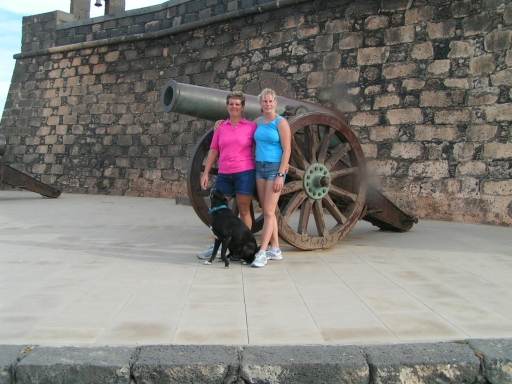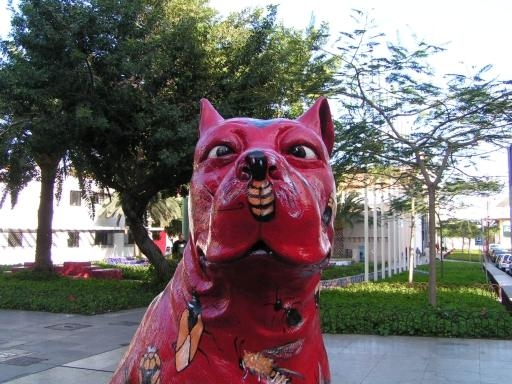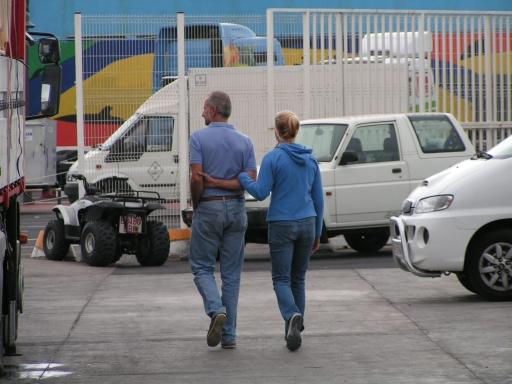

Liz's Journal - Canaries
Page 47 Lanzarote We made landfall in Arricife, Lanzarote sometime during the night and I awoke, not to the sound of rolling waves on the hull but to the sound of banging and drilling as this commercial port began to wake.
The port is a graveyard full of abandoned boats, their hulls barely afloat. After a rough crossing to the Canaries many sailors have given up their dreams of crossing the Atlantic, stepping ashore in Arriciefe and abandoning their boats. The town, or at least the part that we saw was built for tourism, restaurants selling English Breakfasts, Beans on toast and other non Canarian delicacies lined the sidewalks. While on our quest to find a supermarket mom and I enjoyed the tour we received from Barbara onboard Sigueme who was once resident here. The resemblance between the islands of the Azores and the Canary Islands is visible not only in the topography, but also in the architecture. The contrast between the black volcanic rock, used for building and the white paint is present on many of the older buildings. Walking along the beachfront we crossed over the Puente De Las Bolas, the bridge of the balls, built in the 16th century. The bridge leads to the San Gabriel castle, built to protect the island from the Berber Pirates. When I was there however I saw something that looked suspiciously like a raft, wedged up between the rocks. Not wanting to be politically incorrect I will just add that the North Easterly currents wrap forcefully around this point. Leaving Arrecife we passed the San Jose castle. It's surrounding vegetation prominent against the ebony of the volcanic sand it was growing from. Navigating our way out of the bay was rather tricky due to fishing floats and stray lines obstructing the channel. Dad was at the pulpit looking for these obstructions, signalling for me to add or subtract ten degrees from our course. After a few hours underway we pulled into a small bay outside Puerto Rubicon. Although we had received advice that this was a sheltered anchorage, the wind was coming from an unusual direction and soon we decided to weigh anchor and sail over night to Gran Canaria. Gran Canaria Arriving from the North East, motoring and hand steering due to the confused seas we made our way along the outer harbour wall. We anchored in a small bay bordered by two Marinas mid morning and soon occupied ourselves opening hatches and completing our 'end of trip' clean. The Canaries have a very interesting history, Grand Canaria in particular so if you will excuse a brief history lesson… The early inhabitants of the Canaries were called Guanches, pronounced dif-fi-cul-tly. The Guanches are thought to be Cro-Magnon, Berber or Semite in origin although their techniques for preserving their dead bears striking resemblance to the Mummification methods used by the ancient Egyptians. King Juba II of Mauritania sent an expedition in the year 60 BC to the Canary Islands, then known as the Fortunate Islands by early Europeans. What his troops discovered upon arriving, besides the vast nothingness of a volcanic archipelago's lower slopes was a breed of enormous wild dog, indigenous to the islands. They managed to capture two of those dogs and returned with them as a gift to the King. Although the dogs have become smaller through evolution they still bare the scientific name, Insulae Canium- the Island of Dogs. This name persists today as Islas Canarias, or The Canary Islands. So, sorry Tweety but you're named after a dog! A cycle track running the length of the Paseo Maritimo provided me with not only hours of enjoyment but also a little scare. 'J' walking across a four lane main road was an old man whom I later found out was seventy-nine. Listening to music I paid no attention to this daring feat and spinning around, now skating backwards I watched him walk across the last lane. Amazed at the fact that he made it I was about to turn round once more when I heard the screeching of brakes and looked up to find the man knocked off the road and now lay across the cycle track. I stopped suddenly almost tripping myself up and skated to his side skidded to a halt be sides him. The lady driving the car was panicking and the man in the car behind who had braked in time to avoid a collision was on his cell phone with the ambulance. A passer by came to my side and asked if he could help in anyway. I was slightly flustered at suddenly being in charge of an accident scene. I was trying to talk to the elderly man who was thankfully conscious but he was ignoring me attempting to talk to the man at my side. My Spanish had abandoned me and I found myself asking the passer by who thankfully spoke English to translate for me. I asked him his name and age, and for him to please not move or lift his head in any way. Explaining to the man at my side that I was going to run my fingertips down his body feeling for broken bones and if he felt any pain or could not feel my fingers he must tell me. There was a rush of Spanish as he translated and the old mans eyes suddenly became round as he shouted back in Spanish that how could I know what I was doing and that I was younger than his own grand child. We wasted a few more seconds as I explained that I knew what I was doing and that I had been trained in primary and secondary care although if he would prefer we could just wait for the ambulance. After being translated into Spanish he relaxed slightly and I continued with my assessment. Felling his collarbone for breaks I ran my fingers down both arms and legs. When I felt his hips however he winced in pain and I immediately released pressure. The pain in his hips was expected, as that was where the car had hit him. When the ambulance arrived he was having difficultly breathing and I thought that he might be having a heart attack, however the medic assured me hat he was ok although he was straining to talk. I passed the information that I had learnt onto the medic in charge as two others lifted him onto a stretcher and into the back of the Ambulance. Slightly shaken I got to my feet put my earphones in and skated away, watching the scene disappear behind me, I had done all I could do now it was up to the professionals. To this day I don't know what became of him and I wonder if he remembers me, the little girl with wheels on her feet that bossed him about and scolded him when he tried to move. Tenerrife Although we were advised by numerous people not to go to the island of Tenerrife because of its unfriendly approach to boats we decided to take a chance and go anyway. The reason that we didn't heed the advice we were given was because one of the instructors from El Buceo was working in a dive school on the island and had called me asking if I would be able to come over and assist with teaching DSD's. Nothing could have prepared me for what I saw upon entering the harbour. Not only was this a commercial port, dirty and noisy but it was completely destroyed due to the tropical storm that swept through here a few weeks ago. A large percentage of the floating dock was no longer floating, what remained was twisted and ripped off its foundations, even the deserted parking area was piled high with ripped off pieces of the dock. Having slept most the night I set about doing the after sail clean while mom and dad had a siesta. When I took Jack for a walk I found a large area that was smoothly paved and not completely filled with debris from the dock. Returning to the boat I grabbed my roller blades and skated along the twisted jetty, up the ramp and off to have a bit of exercise. When I returned I made the unfortunate mistake of forgetting just how twisted the jetty was. Down the ramp, off the ledge and just before hitting a curve and ending up in the water I gracefully sat down and skidded to the edge, stopping just in time. There and then I decided to take my blades of and, walking the rest of the way I went back to the boat. When mom and dad got up I decided to make my way into town to try and find some tourist information office and hoped to find out the location of another marina closer to Matthias and the dive school and a bus time table. My timing however was not great and after a long walk I found myself in town during siesta, damn! When I inquiries where the bus terminal was I met with blank stares which I returned not quite sure what the problem was, after all the time I have spent in Spain I know enough Spanish to ask where the bus stop was, and yet no one understood a word I was saying. So I started walking, going to the places where bus terminals would normally be found. After walking around hopelessly lost for about half and hour I tried my luck once more with an old man selling bric-a-brac in the local market. Once again I explained what I was looking for and once again I was met with a blank stare. I was about to leave when I saw a bus coming our way. Excitedly I grabbed the mans sleeve and tugged on it almost jumping up and down like a little chid with excitement. Looking up and seeing the bus he said "Guagua", as if it was the most normal word in the world. "Guagua?!" I responded a puzzled look on my face. "Si esta es una Guagua." "Yes this is a Guagua." So this time using my newfound word I explained what I was looking for. Immediately the man knew what I was taking about and, shouting to his friend two stalls down to watch his stuff, he took me under his wing so to speak and led me down the long road around a corner and, pointing to a huge building in the distance he said 'Guaguas'. Thanking him I went on my way and soon found myself in, not only a bus terminal but a ferry terminal as well. After getting a Guagua timetable I returned to the boat, feet hurting yet all in all a successful Guagua mission. I'm sorry but in all my years in Spain I have never heard of the word Guagua. The following day we hired a car and drove to the south of the island stopping in numerous ports looking for marinas in which to berth Gilana. Arriving in Adeja where Matthias was I was depressed I really had been looking forward to helping out at the school and teaching again and, so far we had had no luck finding a berth. Mom and I walked into the school which was deserted, outside however was a man with a diving T-shirt on so, assuming thee obvious I introduced myself and enquired as to where Matthias was. At that moment he came around the corner and honestly I cannot say who was more surprised to see the other. The hard part came when I had to tell him that unfortunately there was no place for Gilana and therefore I would not be able to come to the school.
Mom and dad left to have a look at a few other places while I waited at the school telling Matthias of our dilemma. Hearing this he called a few dive schools who had boats in marinas, even called the owner of the school who was at the north of the island to see if he knew anything. As the owner was coming down anyway he said that he would make a few phone called when he arrived. Some ten or fifteen phone calls later and still no luck, it was really looking bad. Mom and dad returned over and hour later and from the look on their faces as they walked towards me I could tell that they had been unsuccessful. After thanking everyone we made our way back to the car and started the long drive back up to the north of the island. In the back of the car in the dark I cried, no one could see me and I felt that I was being ungrateful but I couldn't help it. I had wanted to teach diving in the Cannaries ever since Matthias first suggested the idea when I started helping out at El Buceo. Oh well, as dad always says 'While sailing the boat takes priority', she's all we have and he's right. Even though no place was found for Gilana the fact that so many people tried to help me achieve what I wanted to do not only my parents and Matthias but also complete strangers whom I had never met, touched me. The following morning we returned the car, slipped lines and headed back to Grand Canaria and dem pooches.


